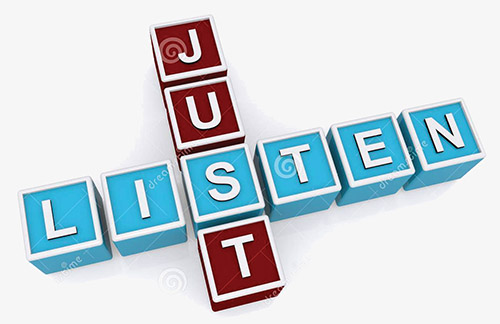
If you really want to help a friend with a serious problem, sometimes the best you can do is to not “do” anything.
No, the above statement is not a typo or a mistake. While it does indeed sound counterintuitive, the reality is that many times all we really need to do is just sit there and truly listen to the other person.
In my nine years of experience as a social worker working with people with eating disorders, anxiety or depression, I’ve learned that “just” listening is often the best support you can offer if your friend is struggling with dysfunctional views of themselves and destructive ways of coping with those views.
According to statistics from the National Association of Anorexia Nervosa and Associated Disorders, at least 30 million people in the U.S. suffer from an eating disorder, and eating disorders have the highest mortality rate of any mental disorder. They also report that 13% of women over the age of 50 engage in some form of eating disorder behavior. According to the National Eating Disorders Association, this problem is on the rise in the Orthodox community yet often underreported, as many families fear the stigma of mental illness (https://www.nationaleatingdisorders.org/eating-disorders-jewish-community).
This information tells us that it is likely that each of us knows at least one person who struggles with this challenge and who is likely reluctant to discuss it openly.
To sit there and listen to what the person across from you is trying to say, without offering judgment or advice after they report using unhealthy coping behaviors, is a huge help. Sit there and observe them when they are tearful and crying. Sit there and note the way the individual looks away, slumps their shoulders and/or shakes their legs. Sit there and empathize with that person that is struggling at the moment and petrified of what may come after finally opening up.
As Jews, our innate initial inclination is to do first, then listen. We want to reach out and help—to comfort mourners, visit the sick and give tzedeka. However, there are many instances in the Torah where silence becomes a powerful tool in hearing Hashem’s voice. For example, when Eliyahu was on Mt. Sinai, after his confrontation with the priests of Baal, he encountered Hashem as “kol demamah dakah,” “the sound of a slender silence.” In order for Eliyahu to really hear Hashem, to understand Hashem, Eliyahu had to remain still and quiet, and just listen.
Similarly, when Job lost his children, and his friends came to comfort him, instead of his friends trying to make him feel better with words of comfort, they sat in silence, to just let him be. In doing so, Job’s friends were not only able to fully understand his pain, but also allowed for Job to be himself in his entirety during this painful time. (Eventually Job did speak, as did his friends, which becomes the remainder and the bulk of the book of Job.)
Don’t get me wrong, it definitely feels more natural to do something. To give a hug, a kiss, a shoulder to cry on, a piece of advice, a command, a book to read, a movie to watch. It feels good to be proactive, to feel as though you are taking control of such a frightening, overwhelming experience. It seems logical, almost imperative, that action is taken at all times, especially as a therapist.
Working on the eating disorder unit at Robert Wood Johnson and in private practice, all I want to do is make my client feel better, to give over my knowledge, so that my client can take action to feel more at ease. However, as the old saying goes, “silence is golden,” and many times, just sitting there is taking action, as you’re actively listening, observing, noting and empathizing with that individual.
I have found that many of my clients (and individuals in general) so badly want to be heard, to feel important and matter. And what better way to grant them that right than sitting back and listening to everything they have to say?
If you notice a friend who appears to be struggling, and starts to open up to you, you are receiving an engraved invitation—and, I’d assert, a religious imperative—to not move to your next mitzvah (or chore), or to offer a quick “fix,” but instead to stop and really, truly listen.
It can make all the difference.
Thank you for not doing anything, for just listening to a person in your life who is really struggling. Because often, listening is really all the other person needs.
Talia Becker, LCSW, has worked in the Robert Wood Johnson Eating Disorders Unit since 2015, both in inpatient and outpatient settings. She also has six years of experience in private practice. She is currently forming an eating disorder support group and invites inquiries, at [email protected].













